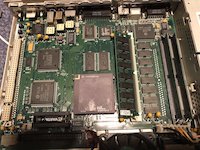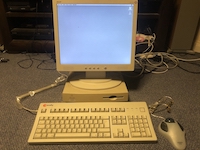Rescued 68k Mac Update
It's been a number of weeks since I found my poor Apple Macintosh LC 475 at the side of the road, and now it's time for an update on how I'm getting on with bringing it back to life.
The big step forward in this restoration/recovery was getting hold of a DB15 to VGA adaptor to convert the Mac's video output into something that can be displayed on a normal LCD screen. This eventually arrived from America, and after flipping switches at random until it did something, I found that I had an output at 1024x768 resolution. As I don't have a hard disk at that point, all I got was a grey screen and a disk symbol, but it's something.
As I now had a video output, I could get on with testing the floppy drives, both the original and the one acquired from the dead Performa, which I had stripped down and cleaned the heads on both. I acquired a ‘Disk Tools' image with help from the kind people on the 68kmla forum and wrote that to a floppy disk to try to boot the machine from. I found pretty quickly that the original floppy drive had absolutely no interest in reading the disk, and that the eject mechanism was intermittant at best, but that's a known issue with these. Luckily the spare floppy drive had none of these issues, and happily booted from floppy.
I've been told time and time again that this machine will need a recap (it's capacitors changed), so I purchased a set from Farnell and soldered them in, it's not the best job but everything works. Also considerably cheaper than having someone else do it.

I didn't have any ADB peripherals, so I hit eBay and spent slightly too much money on a new-in-box Macally keyboard, and a new-in-still-sealed-box Kensington Orbit trackball, which I thought was suitably fitting.
For a monitor, I raided my stock of ancient LCDs in the attic and found an Acer A1712 in beige that worked happily with the adaptor.

Next on the agenda is to source some sort of hard disk for it; either a replacement 50-pin SCSI disk, or go down the modern route of a SCSI2SD.